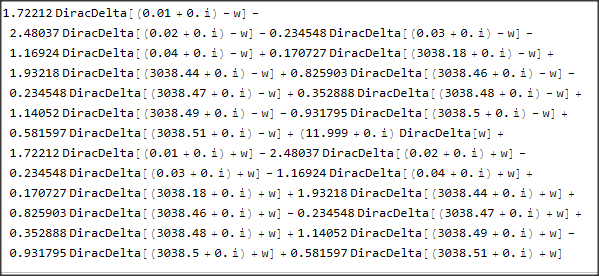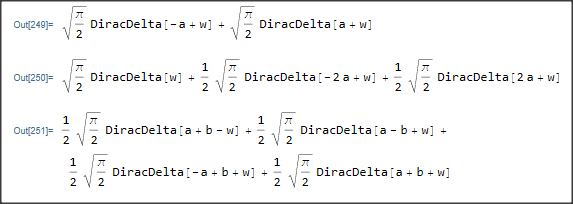I am trying to do Fourier Transformation on the following function Izzn, which is essentially just a lot of trigonometric function, whose Fourier transformation are all well defined. However, when I type FourierTransform[Izzn,t,f], mathematica takes an unreasonably long time to evaluate. By unreasonable, I mean that it never gives the result but keeps evaluating. Some typical terms of Izz are posted below

0.272441 Cos[1519.09 t]^2 + 2.69272 Cos[1519.22 t]^2 +
0.383058 Cos[1519.22 t]^2 -
0.0419625 Cos[1519.22 t] Cos[1519.22 t] +
0.0494935 Cos[1519.22 t]^2 +
0.910475 Cos[1519.22 t] Cos[1519.24 t] +
0.407475 Cos[1519.22 t] Cos[1519.24 t] + 2.42896 Cos[1519.24 t]^2 +
0.127629 Cos[1519.22 t] Cos[1519.25 t] -
0.0659875 Cos[1519.22 t] Cos[1519.25 t] -
0.351161 Cos[1519.24 t] Cos[1519.25 t] + 1.05013 Cos[1519.25 t]^2 -
0.5246 Cos[1519.22 t] Cos[1519.25 t] +
0.0886742 Cos[1519.22 t] Cos[1519.25 t] +
2.17117 Cos[1519.24 t] Cos[1519.25 t] -
2.97282 Cos[1519.25 t] Cos[1519.25 t] + 5.7118 Cos[1519.25 t]^2 -
1.68453 Cos[1519.22 t] Cos[1519.26 t] -
0.181303 Cos[1519.22 t] Cos[1519.26 t] -
5.27604 Cos[1519.24 t] Cos[1519.26 t] +
0.928094 Cos[1519.25 t] Cos[1519.26 t]







FouriernotFourierTransform. $\endgroup$